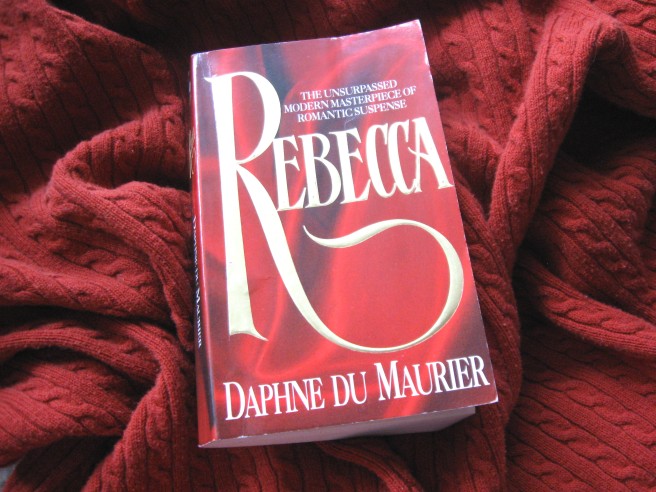
#30 – Rebecca, by Daphne du Maurier
- Read: 2/21/17 – 2/25/17
- Challenge: PopSugar 2017 Reading Challenge; Mount TBR (26/150)
- Task: A book with a red spine
- Rating: 5/5 stars
I always tell myself I shouldn’t read classics just for the sake of their classic-ness, which is why I avoided this for so long, even though I’d heard great things about it. I mean, I heard great things about all sorts of classics I ended up hating.
But I do find myself strangely attracted to sprawling, Gothic fiction, both horror and romance, and Rebecca recalls that period with adeptness. Everything about the prose is ominous, from the framing of seemingly beautiful landscapes and environs as places of dread, to the stiff formality of the characters, reinforcing the themes of misunderstanding and isolation.
And speaking of misunderstandings–I thought I had the plot figured out early on. (This is a classic that had not actually been spoiled for me.) Given the familiar trappings I’ve seen used in later works, I expected certain things from this book, and was pleasantly shocked when I WAS COMPLETELY WRONG ABOUT EVERYTHING. Nothing turned out the way I envisioned, every twist I saw coming happened, but went in a direction I didn’t foresee. It was like driving down a road I’d been down a dozen times before, only someone had moved all the signposts, bringing me to an entirely new destination at journey’s end.
I loved it. Okay, by modern standards, the prose is wordy and drags a bit, but Gothic, people, Gothic sensibilities. They didn’t write tight little action pieces, they wrote atmospheric works pervaded by horrible beauty. You need a lot of words to do that properly.
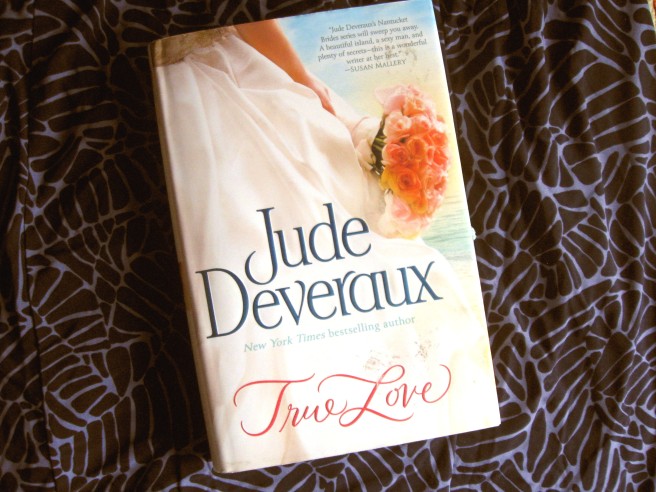
#31 – True Love, by Jude Deveraux
- Read: 2/25/17
- Challenge: Mount TBR (27/150)
- Rating: 1/5 stars
DNF @ page 103. In that hundred pages, I was subjected to:
- Two female characters constantly weight-shaming each other even though they both spent almost all of their time together eating;
- The overly-sly, “look how clever I am” introduction of a family ghost;
- Three-hundred-some years of convoluted family history;
- Way more about architecture than I ever wanted to know;
- And finally, almost a quarter of the way through the book, the two romantic leads finally meet, and zero sparks fly. None. At all. They’re not even kissing by this point, they’re cleaning fish together.
I was too bored to go any farther, despite also having picked up #2 in the series. I donated them both back to the library sale I got them from–maybe somebody else will have more patience than I did.
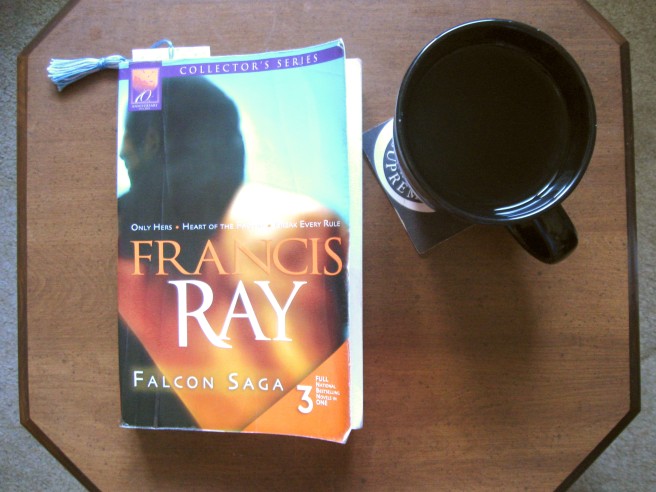
#32 – Falcon Saga, by Francis Ray
- Read: 2/25/17 – 2/27/17
- Challenge: PopSugar 2017 Reading Challenge; Mount TBR (28/150)
- Task: A bestseller from a genre I don’t normally read
- Rating: 2 stars overall
An omnibus of three African-American romances (a subgenre I’ve never read before), I’m going to talk about each one individually, because my experience with each varied so widely.
Only Hers: A good introduction to Ray’s easy, flowing style. I never felt confused about the action or the plot, though partly that was due to there being very little conflict beyond the central one, which was reiterated constantly, to the point where it got annoying. Still, the characters were likeable and I enjoyed the light read. 3 stars.
Heart of the Falcon: OH MY GOD HOW DID THE SAME PERSON WRITE THIS BOOK. The male lead is the worst kind of controlling, arrogant alpha-asshole and I hated him, he didn’t have any redeemable personality. Oh, and how about an unplanned pregnancy? Because that must be the only thing that would make the female lead try to stick to this man, he’s so bad, but we’re supposed to believe this baby he doesn’t even believe at first is his (@#$^$#$@#@#!@!!) thaws him out to the point where he’ll give up his Mr. Bachelor Forever club membership. No, thank you. 1 star? Zero stars? It’s gross.
Break Every Rule: OH MY GOD HOW DID THE SAME PERSON WRITE THIS BOOK? If HotF had the worst romantic hero, BER has the best. Trent is amazing, he’s constantly demonstrating how caring he is, the central conflict between him and his lady-love is believable and better yet, understandable, and OH MY GOD I WANT TO HUG HIM FOREVER. It still lacks much in the way of subplot, but a solid four stars.
The three together felt like a rollercoaster, because if I had randomly picked up Heart of the Falcon first as an individual title, I never would have touched a Francis Ray work again. I might in the future, but not without vetting them first.
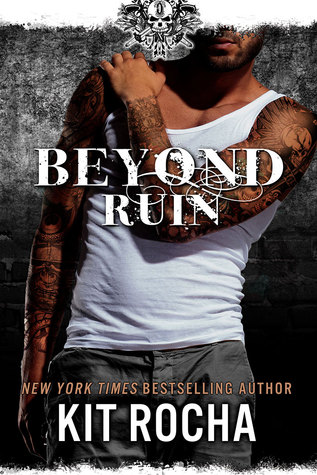
#33 – Beyond Ruin, by Kit Rocha
- Read: 2/27/17 – 2/28/17
- Challenge: Mount TBR (29/150)
- Rating: 2/5 stars
My least favorite entry in the Beyond series so far. While I was intrigued by the idea of a m/m/f/f foursome romance (which all things about these characters in previous books had been leading to) the reality disappointed me.
The best scenes in this were when some two of the four were having a one-on-one moment, whether that involved conversation, sex, or both. When all four of them were in the room together, things got messy. And I’m not talking just about muddy interpersonal relationships, though there was plenty of that–I got hung up on the much simpler matter of pronouns.
How can I be into a scene if I can’t even figure out who’s touching whom? With two he‘s and two she‘s in the same place, I honestly got confused about the ownership of body parts and had to backtrack, something a reader should never have to do.
And one book of a standard romance length doesn’t really have the space to deal with main, continuing plot (which it does) and SIX different interpersonal pairings. Adding that fourth person doubles the number of individual relationships from a threesome, which was handled successfully back in book 4 of the series. It’s even acknowledged in the narrative that some of those six pairings don’t have the same depth or weight as the others, but it still feels woefully unbalanced. I’m not saying no one has ever or could ever pull off a well-developed foursome novel, but I don’t think I read one here.
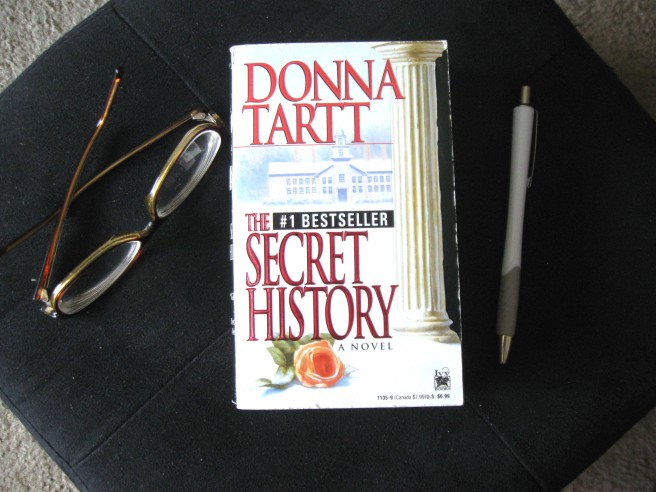
#34 – The Secret History, by Donna Tartt
- Read: 2/28/17 – 3/2/17
- Challenge: Mount TBR (30/150); Beat the Backlist (10/40)
- Rating: 5/5 stars
It’s no secret I’m a fast reader when I want to be, and I was hard-pressed to put down The Secret History. I devoured it.
At first, I thought maybe I was drawn in by the setting and the characters. After all, I went to a Midwestern liberal arts college not entirely unlike the fictional, Vermont-based Hampden; I knew people very like the characters, both the truly well-off who cared little about how they spent their money, and the truly well-off who cared a great deal, and those (like myself and Richard) who were on financial aid and had to worry about our dollars and cents. I was particularly impressed by Richard’s over-winter ordeal of near-hypothermia, having stayed in town one winter when my job meant I couldn’t really go home for break for any reasonable amount of time. I did have a roof over my head, at least, but I’ve experienced the strange, surreal isolation of being in a town that basically shuts down when the college does: you can go days without seeing anyone, nothing stays open past noon, snow everywhere, wind whistling through the trees, not enough lights on in the darkness, and yes, it is almost always dark.
That connection I felt wouldn’t have carried me through the whole story, though, not when everyone seemed to drink their own body weight in alcohol on a nightly basis and do more hard drugs, more casually, than in anything else I’ve ever read. (Not that I don’t know these things go on at colleges, but that wasn’t my scene. I kept reminding myself that this was written in the early ’90s, and the ’80s were dominated by serious, serious drug problems, to put something so outside my own experience into perspective.)
As much as the characters reminded me in some ways of people I’d known, they were also horrible, horrible people with deep flaws that should have made them unsympathetic, and yet, I was fascinated. No, I didn’t like Bunny, and later on I found in myself some pretty intense distaste for Henry and Charles as well, but by then, reading this novel was like watching a fifteen-car pileup on the interstate–it’s terrible and you know you should look away, but you can’t stop yourself, because you want or even need to see what happens. Bunny’s death is announced in the prologue and you spent half the book in agonized anticipation of finding out how it comes about, but the second half? It’s all up in the air, and I just knew someone else wasn’t going to make it. But until it happened, I didn’t know who.
I look forward to rereading this and picking up all the foreshadowing and maneuvering I undoubtedly missed the first time around–this is definitely a book that rewards careful examination.
Rebecca has been on my to-read list since forever. I guess I should get around to it.
LikeLiked by 1 person
YEEEEEESSSSS.
LikeLike